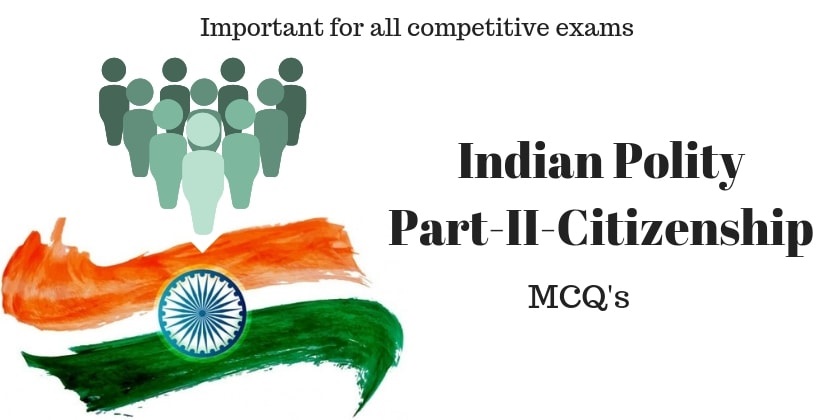11. To become a citizen of India, ________ is not a necessary condition.
A. Birth in India;
B. Descent;
C. Having property in India;
D. Naturalization;
Click to show/hide
12. Which of the following parts of the Indian Constitution deals with citizenship?
A. Part I
B. Part II
C. Part III
D. Part IV
Click to show/hide
13. According to Indian constitution, Domicile means _________ .
A. Temporary Home;
B. Permanent Home;
C. Home in the foreign country
D. Home in friend country;
Click to show/hide
14. By the process of naturalization which one among the following can acquire the citizenship of India.
A. Foreigner
B. Non-Resident India
C. Overseas Indian;
D. All of the above;
Click to show/hide
15. Through naturalization process, to become a citizen of India one must satisfy ________ condition.
A. L One must reside in India
B. His/her character should be good
C. Renounces his/her citizenship of other countries
D. All of above
Click to show/hide
16. Which Article of the Indian Constitution deals with Persons voluntarily acquiring citizenship of a foreign State not to be citizens?
A. Article 5
B. Article 6
C. Article 8
D. Article 9
Click to show/hide
17. Who is called the first citizen of India?
A. The Prime Minister
B. The President
C. The Speaker of Lok Sabha
D. The Chief Justice of India
Click to show/hide
18. In Indian, the concept of single citizenship is adopted from
A. France
B. U.S.A.
C. England
D. Canada
Click to show/hide
19. Who said, “A good citizen makes a good State and a bad citizen makes a bad State”?
A. Laski
B. Aristotle
C. Rousseau
D. Plato
Click to show/hide
20. By which of the following modes can citizenship be acquired?
I. By Birth
II. Hereditary
III. By Registration
IV. By Request
A. I and II
B. I, II and III
C. II and III
D. II, III and IV
Click to show/hide

